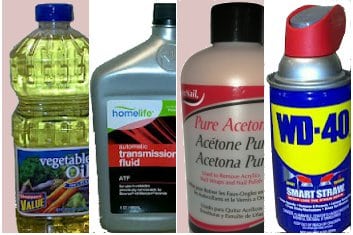When it comes to household lubricants, WD-40 is often the first product that comes to mind. However, many people wonder if vegetable oil can serve as a suitable alternative to WD-40 in various applications. Let’s delve into this topic and explore whether vegetable oil can work like WD-40.
Can You Use Vegetable Oil on a Squeaky Door?
If you have a squeaky door or hinges that are starting to make noise, vegetable oil can be a handy solution. Simply apply a small amount of vegetable oil to a clean cloth and rub it along the hinge. The oil helps lubricate the hinge, reducing friction and eliminating the squeaking sound.
Is Vegetable Oil a Penetrating Oil?
While vegetable oil may not be as effective as specialized penetrating oils, it can still offer some penetrating properties. When applied to rusty bolts or stuck mechanisms, vegetable oil can seep into tight spaces and help loosen the components. However, for more stubborn cases, a dedicated penetrating oil like WD-40 may be more effective.
Can Vegetable Oil Be Used to Lubricate Metal?
Vegetable oils have been used as lubricants in metalworking for many years, especially in small-scale operations and industries with stringent environmental regulations. They can provide lubrication for metal tools and components, making them a viable alternative to traditional lubricants. However, it’s essential to consider the application and ensure that vegetable oil is suitable for the specific metalworking task at hand.
Vegetable Oil vs. WD-40
While vegetable oil can work as a lubricant in certain applications, it may not be as versatile or effective as WD-40 in all scenarios. WD-40 is a specialized product formulated for various tasks, including lubrication, rust prevention, and moisture displacement. It has specific properties that make it ideal for a wide range of uses, from household maintenance to automotive care.
Using Vegetable Oil Wisely
When considering vegetable oil as a substitute for WD-40, it’s essential to understand its limitations. While vegetable oil can provide lubrication and temporary relief for squeaky hinges or rusty bolts, it may not offer the same level of protection or long-lasting effects as WD-40. Additionally, vegetable oil can attract dust and dirt over time, potentially leading to gumming up of components.

Credit: m.youtube.com

Credit: www.engineeringforchange.org
Alternatives to WD-40
If you’re looking for alternatives to WD-40, there are several specialized lubricants and penetrating oils available on the market. These products are designed for specific purposes and offer enhanced performance compared to household oils like vegetable oil. It’s crucial to choose the right lubricant based on your needs and the application requirements.
Frequently Asked Questions
Can I Use Vegetable Oil Instead Of Wd-40?
No, it is not recommended to use vegetable oil instead of WD-40. Vegetable oil may temporarily lubricate hinges or loosen rusty bolts, but it can also attract dirt, gum up, and create a mess. WD-40 is specifically designed as a penetrating oil and offers better performance and protection against rust.
Stick to using WD-40 for optimal results.
Can You Use Vegetable Oil On A Squeaky Door?
Yes, vegetable oil can be used to lubricate a squeaky door. Apply a small amount on a clean cloth and rub it along the hinges.
Is Vegetable Oil A Penetrating Oil?
Yes, vegetable oil can be used as a penetrating oil for lubricating metal and reducing friction. It can be effective for loosening rusty bolts and greasing squeaky hinges. However, it may not be as effective as specialized penetrating oils in some situations.
Can Vegetable Oil Be Used To Lubricate Metal?
Yes, vegetable oil can be used to lubricate metal. It has been used as a lubricant for metalworking tools in small-scale operations and industries with strict environmental regulations. Vegetable oil is safe to use on most surfaces, including metal and plastic.
However, it is important to note that vegetable oil may attract dirt and dust over time.
Conclusion
While vegetable oil can work as a makeshift lubricant in certain situations, it may not be the best substitute for WD-40 in all cases. WD-40’s unique formulation and properties make it a versatile and effective product for various maintenance tasks. When in doubt, it’s advisable to use the right tool for the job and rely on specialized lubricants for optimal results.


